unit1英语修订版(基础模块)学生用书第一册第一单元
unit1英语修订版(基础模块)学生用书第一册第一单元(课堂PPT)

Warming up
1 Listen and match. 听录音,将下列词语与图片匹配。
Key sentences:
Warming up
classroom
教室
Warming up
computer lab
计算机房
Warming up
factory
工厂
Warming up
library
图书馆
Listening and Speaking
3 Listen again and act. 再听录音,根据提示表演对话。
store/sell goods
S1: You know, my school is quite different. S2: Really? In what way? S1: We have our skill-training classes in a store. S2: What do you usually do there? S1: We learn how to sell goods. S2: That’s interesting.
Sophie: What subjects are you taking this term, Li Wei? Li Wei: We all take maths, English and computer basics. Sophie: Do all of you take the same skill-training classes? Li Wei: No. Some of us learn cookery, some learn
Listening and Speaking
2 Listen and practice. 听录音,谈论校园生活。
外研社中职英语基础模块(修订版)第一册Unit1第1课时
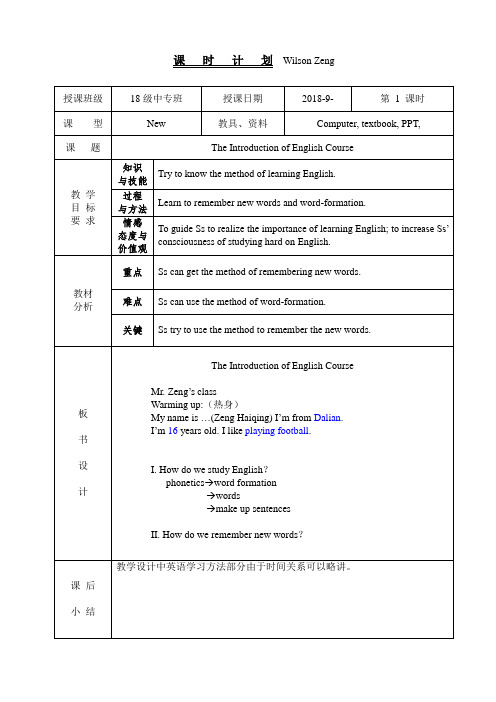
计
TheIntroduction ofEnglishCourse
Mr. Zeng’s class
Warming up:(热身)
My name is…(Zeng Haiqing) I’m fromDalian.
I’m16years old. I likeplaying football.
I.How do we study English?
New teaching.
1、How do we study English?
phoneticsword formation
words
make up sentences
Reading
Speaking instruction of studying English
Listening
Writing
2、How do we remember new words?
5、Introduction of the course & textbook.
课程介绍PPT
1) What to learn.
2) How to learn.
3) The requirements of English class.
1)Clear the learning aim.
2)Speak loudly and bravely.
e.g. Please drive carefully.
②合成法
handbag, homework,something, football,
basketball, housework
③转化法
hand n.手v.上交
empty adj.空的v.倒空
water n.水v.浇水
英语基础模块1 学生用书Unit 1 School Is Interesting
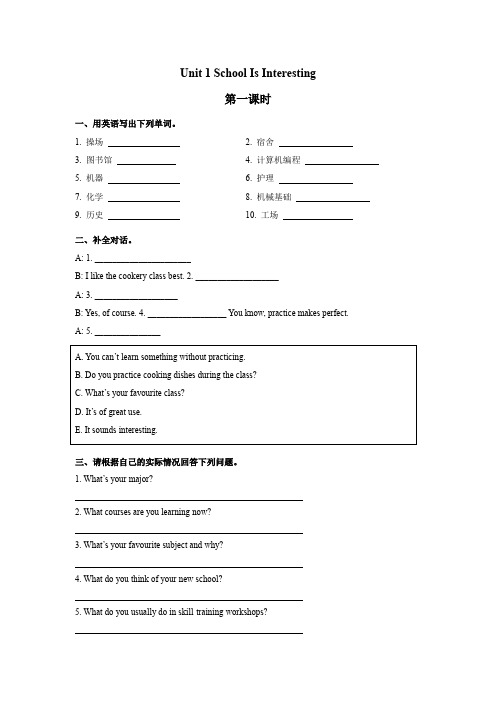
Unit 1 School Is Interesting第一课时一、用英语写出下列单词。
1. 操场2. 宿舍3. 图书馆4. 计算机编程5. 机器6. 护理7. 化学8. 机械基础9. 历史10. 工场二、补全对话。
A: 1. ______________________B: I like the cookery class best. 2. ___________________A: 3. ___________________B: Yes, of course. 4. __________________ You know, practice makes perfect. A: 5. _______________三、请根据自己的实际情况回答下列问题。
1. What’s your major?2. What courses are you learning now?3. What’s your favourite subject and why?4. What do you think of your new school?5. What do you usually do in skill-training workshops?四、连词成句。
1. borrow, can, books, from, library, we, the___________________________________________________________________________ 2. can, take, patients, we, care, in, skill-training, of, the, workshop___________________________________________________________________________ 3. you, happy, new, your, are, school, at___________________________________________________________________________ 4. we, operate, can, to, different, learn, machines, how___________________________________________________________________________ 5. you, different, cooking, do, practice, during, the, class, dishes___________________________________________________________________________五、名人名言。
unit1英语修订版(基础模块)学生用书第一册第一单元知识讲稿

In what way? 是In what way is it different? 的 省略形式。在口语中,常会用到一些省略形式。
usually:通常,表示频率。类似的副词还有 always(总是),often(经常),never(从来不)。
李伟:你知道吗,我的学校与众不同。 索菲: 真的吗?在哪方面呢? 李伟:我们在工厂里上技能训练课。 索菲: 你们通常都在那里做什么呢? 李伟:我们学习如何使用机器。 索菲: 那很有趣。
Reading and Writing
1 Read and learn. 读邮件,了解李伟的学校生活。
accounting, and others learn car-repair. Sophie: What skill-training classes do you like best? Li Wei: I like accounting. It’s very useful.
参考译文
索菲: 李伟,你这学期都上什么课? 李伟:我们全都上数学,英语和计算机基础课。 索菲: 你们都上相同的技能训练课吗? 李伟:不是。我们中有的人学烹饪,有的学会计,还
Key sentences:
Warming up
classroom
教室
Warming up
computer lab
计算机房
Warming up
factory
工厂
Warming up
library
图书馆
Warming up
dormitory
宿舍
1. We have skill-training classes in a factory.
有的学汽车修理。 索菲: 你最喜欢什技能训练课? 李伟:我喜欢会计。这门课很有用。
英语基础模块1 学生用书教学课件升级版Unit1

Scripts: Jane : I used to feel stressed out time Jack: to run for exercise every morning. It works.
1 UUNNIITT
Listening and speaking Reading Grammar Writing Culture express
Pronunciation and listening skills News report Conversation Passage
The pronunciations of the fricatives in each pair are difficult to distinguish. Listen carefully and check (✔)the words you hear.
2 Listen to the conversation again and match each of the opinions and facts
to the speaker.
A I think the job is tiring.
B I have to increase sales.
C I managed to find time for exercise.
The pronunciations of the fricatives in each pair are difficult to distinguish. Listen carefully and check (✔)the words you hear.
英语基础模块第一册第unit教案

学生情况分析
中职入学新生英语水平低、离散度高;缺乏英语学习动力和自觉性,学习习惯不好,没有掌握正确的学习方法和策略。①但是他们好奇心强,精力充沛,动手能力强,在自我认知和人际交往方面有较强的内在需求。
因此,只要教师能从学生的实际水平出发,创设符合他们心理或认知水平的模拟生活实际的教学情境,采用灵活多样的教学手段和方法,结合学生动手能力强的特点,开展丰富多彩的教学活动,就能激发学生的学习兴趣和动力,取得良好的教学效果。在整个教学过程中,教师要注意学习方法和策略指导。
3.请同学们看首页大图,介绍本单元课题。让学生通过标题Nice People, Nice Places猜测本课学习内容及词汇。
听、看、思考、回答问题,明确学习目标。
掌握英语听力相关技巧和技能;
感知there be句型的用法及形容词作表语和定语的用法;
介绍自己喜欢或熟悉的地方。
教学
难点
区别使用常见国名和国籍的英文表达法;
引导学生用所学知识自如地表演。
指导学生体会、掌握、运用英语听力的各种技巧、技能和策略;
引导学生将“语言输入”有效转化成“语言输出”。
教学
方法
听说法、情境教学法、小组合作法、媒体演示法、游戏教学法
第3课时:练习课。听写、评价作业。巩固提高学生的学习内容。
第4-5课时:阅读课。内容为本单元的Reading and Writing部分和Around theWorld部分。引导学生在阅读中初步了解外国文化的同时,体会阅读的乐趣。
英语(基础模块)第一册Unit 1Ready for Your Campus Life
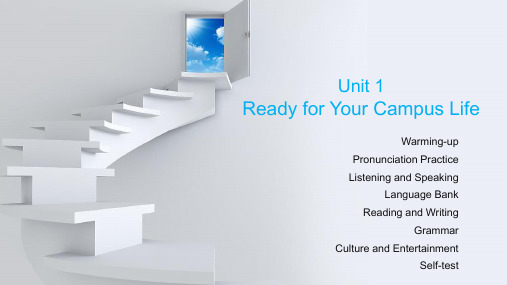
We have three classes in the morning.In the afternoon ,we go to the car factory or the carrepairing station for practice classes.
After class, we have many interesting activities,like playing football, singing, dancing,etc.I have a good time
We are students..
You are doctors
They /The men are workers. They are pencils.
⑵否定形式是在系动词be后not。 疑问式是把be动词移动到主语前。例如: Are you student?肯定: Yes, I am.
否定:No,I am not.或No, I 'm not. Is she a teacher? 肯定:Yes,she is.
Page 3
Page 4
Page 5
●Reading and Writing
⒈Pre-reading.
⑴What does the writer learn in the vocational scool? ⑵What does the writer feel at first in the vocational school?
否定:No,she isn't. Page 7
Are they workers?肯定:Yes,they are.
.
否定:No, they aren't.
There be …某处有……
英语1基础模块第一单元知识点讲解
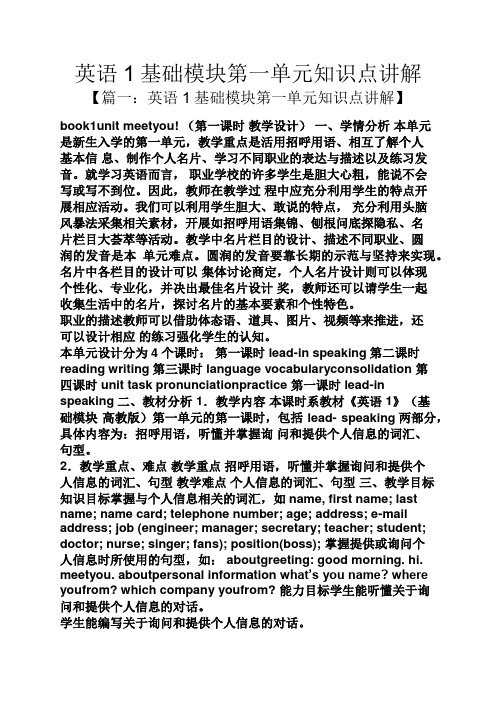
英语1基础模块第一单元知识点讲解【篇一:英语1基础模块第一单元知识点讲解】book1unit meetyou! (第一课时教学设计)一、学情分析本单元是新生入学的第一单元,教学重点是活用招呼用语、相互了解个人基本信息、制作个人名片、学习不同职业的表达与描述以及练习发音。
就学习英语而言,职业学校的许多学生是胆大心粗,能说不会写或写不到位。
因此,教师在教学过程中应充分利用学生的特点开展相应活动。
我们可以利用学生胆大、敢说的特点,充分利用头脑风暴法采集相关素材,开展如招呼用语集锦、刨根问底探隐私、名片栏目大荟萃等活动。
教学中名片栏目的设计、描述不同职业、圆润的发音是本单元难点。
圆润的发音要靠长期的示范与坚持来实现。
名片中各栏目的设计可以集体讨论商定,个人名片设计则可以体现个性化、专业化,并决出最佳名片设计奖,教师还可以请学生一起收集生活中的名片,探讨名片的基本要素和个性特色。
职业的描述教师可以借助体态语、道具、图片、视频等来推进,还可以设计相应的练习强化学生的认知。
本单元设计分为4 个课时:第一课时 lead-in speaking第二课时reading writing第三课时 language vocabularyconsolidation 第四课时 unit task pronunciationpractice 第一课时 lead-in speaking二、教材分析 1.教学内容本课时系教材《英语 1》(基础模块高教版)第一单元的第一课时,包括 lead- speaking两部分,具体内容为:招呼用语,听懂并掌握询问和提供个人信息的词汇、句型。
2.教学重点、难点教学重点招呼用语,听懂并掌握询问和提供个人信息的词汇、句型教学难点个人信息的词汇、句型三、教学目标知识目标掌握与个人信息相关的词汇,如name, first name; last name; name card; telephone number; age; address; e-mail address; job (engineer; manager; secretary; teacher; student; doctor; nurse; singer; fans); position(boss); 掌握提供或询问个人信息时所使用的句型,如: aboutgreeting: good morning. hi. meetyou. aboutpersonal information what’s you name? where youfrom? which company youfrom? 能力目标学生能听懂关于询问和提供个人信息的对话。
英语基础模块1 学生用书Welcome Unit-1
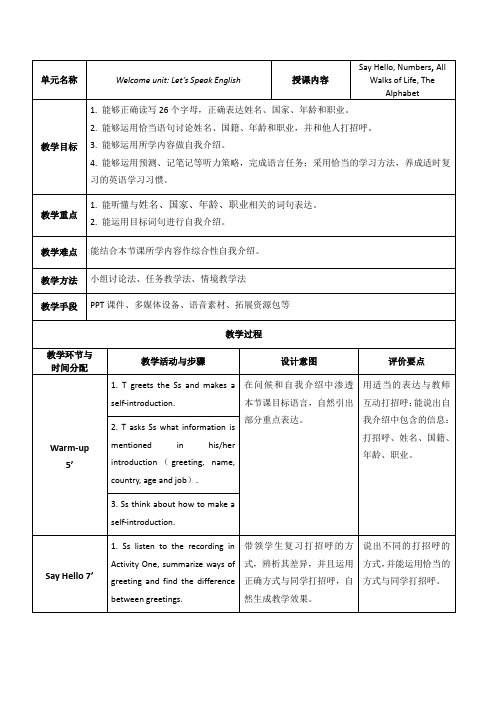
8.T gives some maps of familiar countriesin Activity Twoand asksSs to tell theirnames.
正确说出缺失的字母。
3.Tasks some students to write the missing letters on the blackboard with four-line grid.
4. T emphasizes the correct writing of each letter.(T can give some wrong ways of writing and askSs to judge and correct.)
从上一个数字话题过渡到职业话题,用图片的形式引入。
正确说出图片中的人数及他们所属的职业。
2.Tshowspictures one by one and asksSs to speak out the jobsin Activity One.
3.T asks some students about their parents’jobs.
教师在与学生的对话中运用不同方式问询职业,引导学生总结谈论职业的目标语句。
正确回答教师的问题,说出谈论职业的问句和答句。
4.Ss listen to the recordingin ActivityTwo and summarize different ways of asking and answering about jobs.
英语基础模块1 学生用书教学课件升级版英语基础模块1-TU1

01 02 03 04
01
There must be many different activities at your new school. What are they? Are you enjoying your “busy” life? Make a weekly plan for yourself.
03
• Each group should select one person to make a report about the survey results to the class.
• Find the classmates who like the same sports and form different sports groups.
can get there from your school. Let your classmates guess what place it is.
02 Make a self-introduction card, including your name, character, hobbies and what kind of friends you would like to make etc.
My name My character My hobbies I’d like to make friends with people who are
04
Draw a map of your school’s surrounding area.
School You are here
04
• Show your map to the class and make a presentation. • Choose a place on your map and describe how you
unit1英语修订版(基础模块)学生用书第一册第一单元

Listening and Speaking
3 Listen again and act. 再听录音,根据提示表演对话。
store/sell goods
S1: You know, my school is quite different. S2: Really? In what way? S1: We have our skill-training classes in a store. S2: What do you usually do there? S1: We learn how to sell goods. S2: That’s interesting.
Warming up
1 Listen and match. 听录音,将下列词语与图片匹配。
Key sentences:
Warming up
classroom
教室
Warming up
computer lab
计算机房
Warming up
factory
工厂
Warming up
library
图书馆
accounting, and others learn car-repair. Sophie: What skill-training classes do you like best? Li Wei: I like accounting. It’s very useful.
参考译文
索菲: 李伟,你这学期都上什么课? 李伟:我们全都上数学,英语和计算机基础课。 索菲: 你们都上相同的技能训练课吗? 李伟:不是。我们中有的人学烹饪,有的学会计,还
√ English √ maths
√ cooking
√ car-repair
英语基础模块1 学生用书B1U4P3 教案(改)

Debate
Sharingbikesis good. Sharingbikesis bad.
通过共享单车乱停乱放的图片引导学生思考共享交通方式存在的问题、产生问题的原因以及解决问题的办法。
看图发表观点,能够发现问题,分析问题存在的原因,提出一定的解决方案。
2.T asks Ss to have a debateabout bike-sharing:It’sgood orIt’sbad. Ss are divided into two groups according to theiropinions and debate against the other group with supporting ideas and facts.
Homework: Sswrite down their opinionsabout the sharingbikesand give reasons.
梳理所学内容,回顾语言知识中的重难点用相关语言知识和辩论内容,完成语篇输出表达。
板书设计
3. Ss listen to the text recording and guess the meaning of difficult words. T analyzes the key expressionsandThere bepattern:
(1)effects, advantages, ease, rush hour, block, etc.
(2) What are they?
带着问题通读课文,快速捕捉关键信息,初步了解文章内容。
抓住问题关键,捕捉关键信息,准确定位答案。
2.Ssscan the text andfind outitsbasicstructure.
英语基础模块1 学生用书B1U1P4 教案
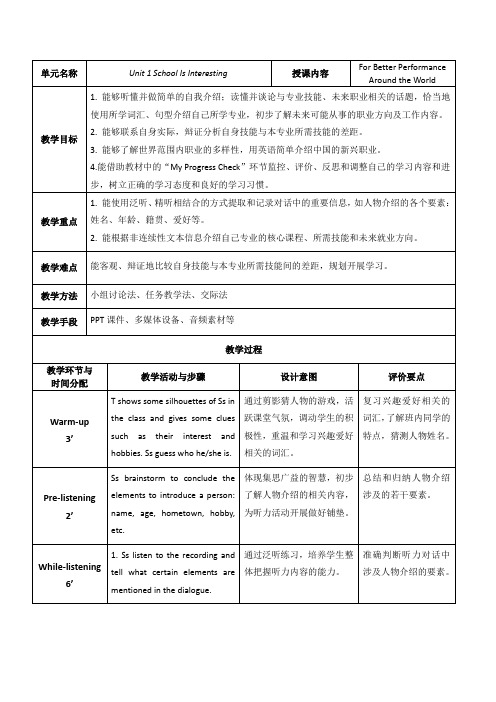
While-listening
6’
1.Sslisten to the recording and tell whatcertain elements are mentioned in the dialogue.
通过泛听练习,培养学生整体把握听力内容的能力。
准确判断听力对话中涉及人物介绍的要素。
在语境中轻松掌握语音知识,通过朗读、比较和分析,明确相近元音的发音异同点。
正确朗读例句,掌握俗语的中文大意,明确/i:/和/i/的异同点。
Summary
&
Homework
3’
Summary:With the help of T,Sstry to sort out the knowledge points and have the assessment in “My Progress Check”.
复习兴趣爱好相关的词汇,了解班内同学的特点,猜测人物姓名。
Pre-listening
2’
Ssbrainstorm to conclude the elements to introduce a person: name, age, hometown, hobby,etc.
体现集思广益的智慧,初步了解人物介绍的相关内容,为听力活动开展做好铺垫。
引导学生综合运用略读和扫读的阅读策略,了解文章大意,发表个人看法,学会根据上下文猜测词义,提高阅读效率。
略读和扫读文章,根据所给图片猜测小标题大意,并通过上下文猜测文中词义,谈论自己感兴趣的专业。
2. Ssshare their ideas on other interesting majors. T helps Ss to talk about the interesting majors by following the given passage.
英语基础模块unit1PPT课件

5
精选ppt课件2021
Group 3 /p/ and /b/
Script (1) There is a bear in the zoo. (2) My cap is black.
6
精选ppt课件2021
Group 4 /p/ and /f/
Script (1) I bought a pan yesterday. (2) The restaurant is full of people now.
叫做major?me?d??r主修computerk?m?pju?t?r计算机电脑science?sa??nscontinuednewwords精选ppt课件202113art美术number?n?mb?r数字minema?npron
英语
基础模块
精选ppt课件2021
上册
1
Unit 1 Greetings
4. Nice to meet you, Jane. nice to meet you意为“很高兴见到你”,常用于初次见面。其回答 为Nice to meet you, too. 初次见面的问候语还有How do you do? /How are you?其回答为How do you do?/Fine, thank you.例如: —Nice to meet you, Miss Gao. 高小姐很高兴见到你。 — Nice to meet you, too. 很高兴见到你。
Section B Listening and Speaking
Warm-up
Dialogue Study
Activities
9
精选ppt课件2021
Warm-up
Look at the picture and tick. Emily and Jenny meet each other for the first time. Tick what they would say.
英语基础模块1 学生用书B1U2P1 教案

happened.
进内容理解。
7. T tells Ss that the girl in the 培养学生理解细节的听力 采用记笔记策略提取 picture was a bit down because 策略,通过记笔记,提升学 细节信息,找到女孩情 something happened to her. Ss 生信息判断和关键信息的 绪低落的原因。 listen to the dialogue and take 提取能力。 down notes to find out the reason.
间发生的动作或存在
being in a time before now.
的状态。
Post-listening 15’
1. Ss work in groups and discuss 引导学生站在当事人朋友 小组讨论,说明原谅或
about the following question:
的角度思考问题,鼓励呈现 不原谅琳恩的原因。
work in pairs to act out new 现语言的控制性输出。
话。
dialogues.
6. T shows the picture in Activity 听前看图预测主题,缩小预 猜测图片中人物的情
Four. Ss discuss and guess what 测范围,提高听的效率,促 绪和可能经历的事情。
in the pictures.
能力。
2. Ss listen to the recording and 通过图、词、音、义的对应, 正确对应活动图片和 catch the activities they’ve 帮助学生回顾旧知,整理有 相关英文表达。 heard. Match pictures with the 关社交活动的短语。 relevant phrases in Activity One.
英语(基础模块)第一册第01-unit1教案
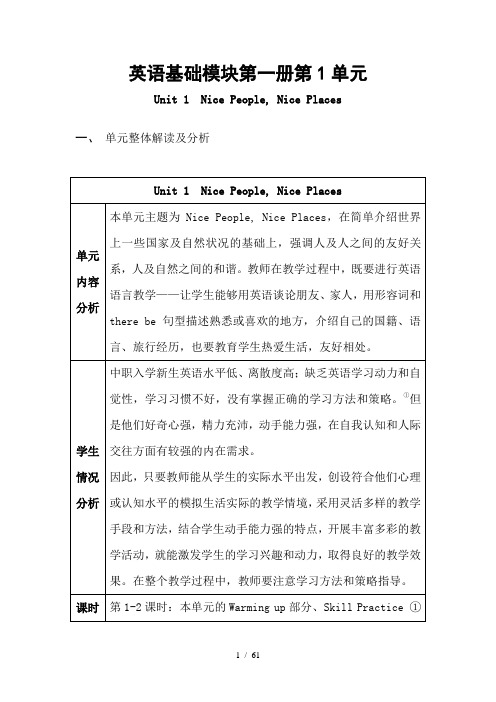
它国家名,并在
地图上找出所说
国家的位置。
听录音,完成12
页 ④,看PPT,
识记句型。
观察,听教师举
例,看板书。
充分调动学生的口、耳、手、脑,提高学习效率。
补充词汇,扩大词汇量。
了解这些国家的地理位置。
引导学生明白基本句型。
8’
操练
1.Choral repetition
教师问:Where are you from? / Where do you come from?并在PPT上依次显示出几个国家名,如France,etc.请全班同学回答;又问学生How doyou find it?并在PPT上依次显示几个形容词,如beautiful,friendly,etc.
2)举例:
A: Where are you from?
B: I’m fromChina.
A: How do you find it?
B:It’s beautiful and the people
are nice.
听录音将图片和国名连起来。
听录音跟读单词。
跟读、识记。
跟读、识记。
回答问题。
Brainstorming,快
填写单词,完成对话,巩固句型和单词的拼写。
创设语言情境,并在愉悦的游戏和比赛竞争中,培养学生主动参及、合作探究的意识。
2’
课
堂
小结:
教师提问:Who can tell me whatwehave learned?(请学生说……)Look at the blackboard. Todaywe’ve learnedsomenewwords andsentences.Please read after me.(领读黑板上的句子)
外研社中职英语基础模块修订版 UNIT1

is David. David, this is Li Xiao.
Li Xiao: Nice to meet you.
David: Nice to meet you, too.
Li Xiao: Are you from England, David?
David: Yes. I came here to join the summer school.
参考译文
刘华:你好,李晓。让我给你介绍一位新朋友吧。这是戴 维。戴维,这是李晓。
李晓:很高兴认识你。 戴维:我也很高兴认识你。 李晓:戴维,你是来自英国吗? 戴维:是的。我到这里来上暑期班。 李晓:哦,欢迎到我们学校来。希望你在这里过得愉快。 戴维:谢谢!我很高兴能有这个机会。希望能在这里结交
更多的朋友。
Sophie: Thank you! I'm very happy to have this opportunity. I want to make more friends here.
Listening and Speaking
4 Listen and practice. 听录音,练习介绍新同事。
Mr Li: Ms Xie, let me introduce Mr Brown to you. He
is our new foreign teacher from the US. Mr
Brown, this is Ms Xie, the assistant of our
headteacher. She will show you around.
李先生:谢女士,请允许我向你介绍布朗先生。他是我 们的新外语老师,来自美国。布朗先生,这位 是谢女士,我们学校的校长助理。她会带你四 处看看了解一下环境。
- 1、下载文档前请自行甄别文档内容的完整性,平台不提供额外的编辑、内容补充、找答案等附加服务。
- 2、"仅部分预览"的文档,不可在线预览部分如存在完整性等问题,可反馈申请退款(可完整预览的文档不适用该条件!)。
- 3、如文档侵犯您的权益,请联系客服反馈,我们会尽快为您处理(人工客服工作时间:9:00-18:30)。
Warming up
dormitory
宿舍
1. We have skill-training classes in a factory.
我们在一家工厂里上技能训练课。
2. There are six students in my dormitory.
我的宿舍里有六位同学。
Warming up
2 Look and tick. 看图,选出你学过的课程。
有的学汽车修理。 索菲: 你最喜欢什么技能训练课? 李伟:我喜欢会计。这门课很有用。
Listening and Speaking
5 Listen again and fill. 再听录音,填写下表。
All take Some take Li Wei likes
Subjects
maths, English, computer basics cookery, accounting, car-repair accounting
Listening and Speaking
2 Listen and practice. 听录音,谈论校园生活。
Li Wei: You know, my school is quite different. Sophie: Really? In what way? Li Wei: We have our skill-training classes in a factory. Sophie: What do you usually do there? Li Wei: We learn how to use the machines. Sophie: That’s interesting.
Listening and Speaking
3 Listen again and act. 再听录音,根据提示表演对话。
store/sell goods
S1: You know, my school is quite different. S2: Really? In what way? S1: We have our skill-training classes in a store. S2: What do you usually do there? S1: We learn how to sell goods. S2: That’s interesting.
Warming up
1 Listen and match. 听录音,将下列词语与图片匹配。
Keylassroom
教室
Warming up
computer lab
计算机房
Warming up
factory
工厂
Warming up
library
图书馆
Sophie: What subjects are you taking this term, Li Wei? Li Wei: We all take maths, English and computer basics. Sophie: Do all of you take the same skill-training classes? Li Wei: No. Some of us learn cookery, some learn
restaurant. S2: What do you usually do there? S1: We learn how to prepare food. S2: That’s interesting.
Listening and Speaking
4 Listen and practice. 听录音,谈论学校课程。
参考译文
In what way? 是In what way is it different? 的 省略形式。在口语中,常会用到一些省略形式。
usually:通常,表示频率。类似的副词还有 always(总是),often(经常),never(从来不)。
李伟:你知道吗,我的学校与众不同。 索菲: 真的吗?在哪方面呢? 李伟:我们在工厂里上技能训练课。 索菲: 你们通常都在那里做什么呢? 李伟:我们学习如何使用机器。 索菲: 那很有趣。
accounting, and others learn car-repair. Sophie: What skill-training classes do you like best? Li Wei: I like accounting. It’s very useful.
参考译文
索菲: 李伟,你这学期都上什么课? 李伟:我们全都上数学,英语和计算机基础课。 索菲: 你们都上相同的技能训练课吗? 李伟:不是。我们中有的人学烹饪,有的学会计,还
√ English √ maths
√ cooking
√ car-repair
√ √ computer basics chemistry
Listening and Speaking
1 Listen and learn. 听录音,学习下列词语。
skill n. 技能 train v. 培训 machine n. 机器 subject n. 学科,科目 cookery n. 烹饪 accounting n. 会计
Listening and Speaking
3 Listen again and act. 再听录音,根据提示表演对话。
restaurant/prepare food
S1: You know, my school is quite different. S2: Really? In what way? S1: We have our skill-training classes in a
Unit 1
School becomes interesting.
Look at the picture and discuss:
1. Where are they? 2. What are they doing?
You’ll be able to:
1. describe school subjects; 2. talk about after-school activities.
